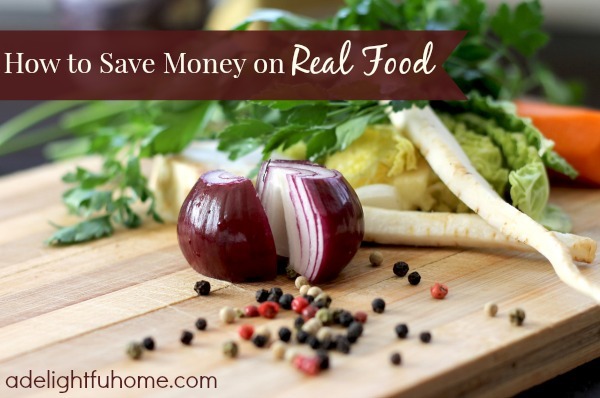You want to eat a real food diet, but it can get expensive!
It can be so discouraging to stand in the grocery store and finagle with your finances to try to find ways to pay for everything you'd like to buy for your family.
I've been there.
Over the past few years, I've learned a few different ways to save money on real food. These methods enable me to buy more food and better food for my family.
Today I want to share five tips with you:
1. Buy through a Co-op
These days I don't do as much shopping at the grocery store as I used to. Instead, I purchase a lot of staples through an online coop called Azure Standard.
They deliver to many parts of the United States. If they don't deliver to your area, perhaps there are other coops near by that you can join.
This particular coop delivers by refrigerated truck, so I am able to buy frozen goods as well as dry items.
During the Fall I am able to get 20 lbs of organic apples for $20! This is just not something you are likely to find at your local Whole Foods!
2. Go Homemade
Making my own food is generally cheaper than buying ready made stuff.
The two areas I've noticed this the most are snacks and broth!
Store bought snacks are usually expensive and don't last long. I still buy them occasionally (especially if I am really tired), but I always notice how fast they go! Then I need to buy more!
Homemade broth is so good for you and is made from stuff you'd throw away! You can't get more frugal than that.
There are many other items you can make at home that save money. And it's not just about saving money, usually these things end up being much healthier, plus you know exactly what's in them.
3. Plan Meals
Planning meals saves lots of money and cuts down on last minute fast food stops.
It also helps you spend less at the grocery store.
In her book, Real Food on a Real Budget, Stephanie says:
“I don’t overspend at the grocery store, because I know exactly what I need to buy to be able to make my meals, allowing me to make a list and stick to it. I also save money by not needing to run out to the store for one or two ingredients throughout the week, where I would inevitably end up spending more money.”
Planning meals does take some time. But it usually ends up in money saved and healthier food for you and your family.
4. Buy in Bulk
Many food items are cheaper if you purchase in bulk.
Some of the items I regularly buy in bulk include:
- oats
- rice
- baking powder
- baking soda
- honey
- sucanat
- meat (for the freezer)
Warehouse clubs like Costco or Sam's are great places to buy in bulk, as are coops, such as the one mentioned above.
I find that buying in bulk also saves me a lot of time. I'm stocked up and prepared for a number of months without the need for extra items on my shopping list.
Some items should not be purchased in bulk as they are prone to go bad rather quickly.
Some of the items that might not be best to buy in bulk include:
- nuts – they go rancid quickly. If buying in bulk, consider freezing them
- oils – again, they go rancid fairly quickly (except coconut oil, which is stable at room temperature)(I learned these from Real Food on a Real Budget)
(I learned these tips from Real Food on a Real Budget)
5. Grown Your Own
The eBook, Frugal Secrets of Real Foodies, gives the following advice:
“One great way to get plenty of fruits and vegetables without breaking the bank is to grow them yourself. Growing your own food can sometimes sound daunting, but with the right resources it is something anyone can do.
Fresh produce can be grown on plots of land, in back yard gardens, on apartment porches, and even in your windowsill.”
– Frugal Secrets of Real Foodies
Even just one pot with a few herbs will save a little money. Gardening does not have to be all-or-nothing (I really not very good at it). But just a little can save some money. And that adds up.
Would love to hear your tips for saving money on real food.



 My Greatest Mothering Struggle
My Greatest Mothering Struggle
A local church has a frozen food bulk sale to raise money for their youth group every year. We spend almost $300 but then we are stocked up on most of our veg for the year! It usually fills our freezer!